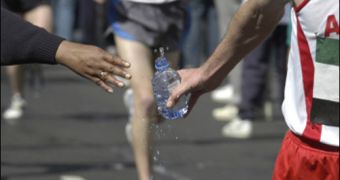Water is a cooling factor for the heated body of a runner. This old concept was adopted by the sportsmen believing that drinking large water amounts will maintain their body's temperature down, improving performance. But a new research made at University of Exeter by a team led by Dr. Chris Byrne revealed that large fluid intake does not induce any of these effects.
The average runner loses 1-1.5 liters of sweat each hour of running and his/her body temperature can rise over 39 degrees C from 37.
"We'll see many of today's Marathon runners clutching bottles of water. The conventional view among both scientists and the fitness media is that fully replacing sweat losses by fluid intake during exercise will reduce an athlete's body temperature and improve performance. Our research, which for the first time measured internal body temperature continuously during an actual race, revealed no evidence that fluid intake makes runners cooler or improves performance." said Byrne, sport scientist.
His team tracked male runners participating in the Singapore Army Half-Marathon, a 21km (13 mi) race, taking place at 26-29 degrees C and 75-90% air's relative humidity. The night before, the participants swallowed telemetric temperature sensors, made of temperature-sensitive quartz crystal oscillators whose movements is linked to the surrounding temperature and transmit the data by radio wave to a portable device. Other approaches measured body temperatures after the race, but this one is the first that tracked down body temperatures continuously throughout a race.
More than 50 % of the subjects' body temperatures surpassed 40 degrees C and they lost an average of 1.5 liters of sweat per hour. The sweat loss was replaced by 6% to 73% with water during the race, but there was no connection between a subject's ingested water quantities, body temperature and overall performance in the race.
The greatest value for body temperature (41.7?C) was measured on a participant that was also the least dehydrated, as he replaced the largest percentage of sweat losses (73%).
"I would encourage those people taking part in today's Marathon to be well hydrated before the race, but not to feel they need to drink water throughout the event. Listen to your body and drink if you feel thirsty, but drinking several litres of water will not help you run any faster." concluded Byrne.
An interesting theory about human evolution says early humans employed marathon-like hunting session to exhaust and kill their prey. Of course, during the chase they did not drink, as this type of hunt is still employed by some hunters-gatherers (like Bushmen) and this depicts an adaptation of our species to running large distances without any water intake.

 14 DAY TRIAL //
14 DAY TRIAL //